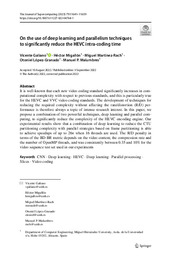Por favor, use este identificador para citar o enlazar este ítem:
https://hdl.handle.net/11000/30426
On the use of deep learning and parallelism techniques
to signifcantly reduce the HEVC intra‑coding time
Título :
On the use of deep learning and parallelism techniques
to signifcantly reduce the HEVC intra‑coding time |
Autor :
Galiano, Vicente 
Migallon, Hector 
Martínez-Rach, Miguel Onofre 
López Granado, Otoniel Mario 
Perez Malumbres, Manuel  |
Editor :
Springer |
Departamento:
Departamentos de la UMH::Ingeniería de Computadores |
Fecha de publicación:
2022-08 |
URI :
https://hdl.handle.net/11000/30426 |
Resumen :
It is well-known that each new video coding standard signifcantly increases in computational complexity with respect to previous standards, and this is particularly true
for the HEVC and VVC video coding standards. The development of techniques for
reducing the required complexity without afecting the rate/distortion (R/D) performance is therefore always a topic of intense research interest. In this paper, we
propose a combination of two powerful techniques, deep learning and parallel computing, to signifcantly reduce the complexity of the HEVC encoding engine. Our
experimental results show that a combination of deep learning to reduce the CTU
partitioning complexity with parallel strategies based on frame partitioning is able
to achieve speedups of up to 26× when 16 threads are used. The R/D penalty in
terms of the BD-BR metric depends on the video content, the compression rate and
the number of OpenMP threads, and was consistently between 0.35 and 10% for the
video sequence test set used in our experiments
|
Palabras clave/Materias:
CNN
Deep learning
HEVC
Deep learning
Parallel processing
Slices
Video coding |
Área de conocimiento :
CDU: Ciencias aplicadas: Ingeniería. Tecnología |
Tipo documento :
application/pdf |
Derechos de acceso:
info:eu-repo/semantics/openAccess |
DOI :
https://doi.org/10.1007/s11227-022-04764-1 |
Aparece en las colecciones:
Artículos Ingeniería de computadores
|
 La licencia se describe como: Atribución-NonComercial-NoDerivada 4.0 Internacional.
La licencia se describe como: Atribución-NonComercial-NoDerivada 4.0 Internacional.
 La licencia se describe como: Atribución-NonComercial-NoDerivada 4.0 Internacional.
La licencia se describe como: Atribución-NonComercial-NoDerivada 4.0 Internacional.
.png)
